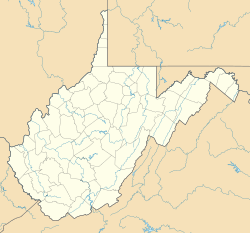Organ Cave, West Virginia facts for kids
Quick facts for kids
Organ Cave, West Virginia
|
|
|---|---|
| Country | United States |
| State | West Virginia |
| County | Greenbrier |
| Elevation | 2,178 ft (664 m) |
| Time zone | UTC-5 (Eastern (EST)) |
| • Summer (DST) | UTC-4 (EDT) |
| Area code(s) | 304 & 681 |
| GNIS feature ID | 1555270 |
Organ Cave is a small community in Greenbrier County, West Virginia, United States. It's not a city with its own government, but a place where people live. You can find Organ Cave along U.S. Route 219 and West Virginia Route 63. It is about 4 miles (6.4 km) southeast of a town called Ronceverte.
Contents
Organ Cave: A Cool Place in West Virginia
The most famous thing about Organ Cave is, you guessed it, the amazing Organ Cave itself! This cave is super long. In fact, it's the ninth longest mapped cave in the entire United States. It's a really special place with a lot of history and natural wonders.
Exploring Organ Cave's History
Organ Cave has played an important role in American history. People used the cave for mining during several big wars.
Saltpeter Mining During Wars
During the American Revolutionary War, the War of 1812, and the American Civil War, Organ Cave was a busy place. Miners worked hard to extract something called saltpeter from the cave. Saltpeter was a very important ingredient. It was used to make gunpowder, which was needed for weapons during these wars.
General Lee's Visit
During the Civil War, a famous general named Robert E. Lee visited Organ Cave. He and his soldiers even held a church service inside the main entrance room of the cave. Imagine having a church service in a giant cave! The parts of the cave where mining happened during the Civil War are still very well preserved. You can see them if you take a tour of the cave today.
The Mystery of the Giant Sloth
Organ Cave isn't just about history; it's also about amazing science! Early miners found something incredible deep inside the cave.
Thomas Jefferson's Discovery
The miners discovered the bones of a huge, unknown animal. The cave's owner sent some of these bones to Thomas Jefferson. At the time, Thomas Jefferson was a very important person. He was one of the Founding Fathers of the United States. He was also very interested in science.
Jefferson looked at the bones, which included a forearm and a hand with giant claws. He thought they belonged to a "Megalonyx," which means "Giant Lion" in Latin. This was the first time anyone in the United States had found bones of a giant ground sloth. Jefferson soon realized it wasn't a lion at all, but a type of extinct sloth. Even though he changed his mind about it being a lion, the name "Megalonyx" stuck. Today, this specific type of giant sloth is known as Megalonyx jeffersoni, named after Thomas Jefferson!



